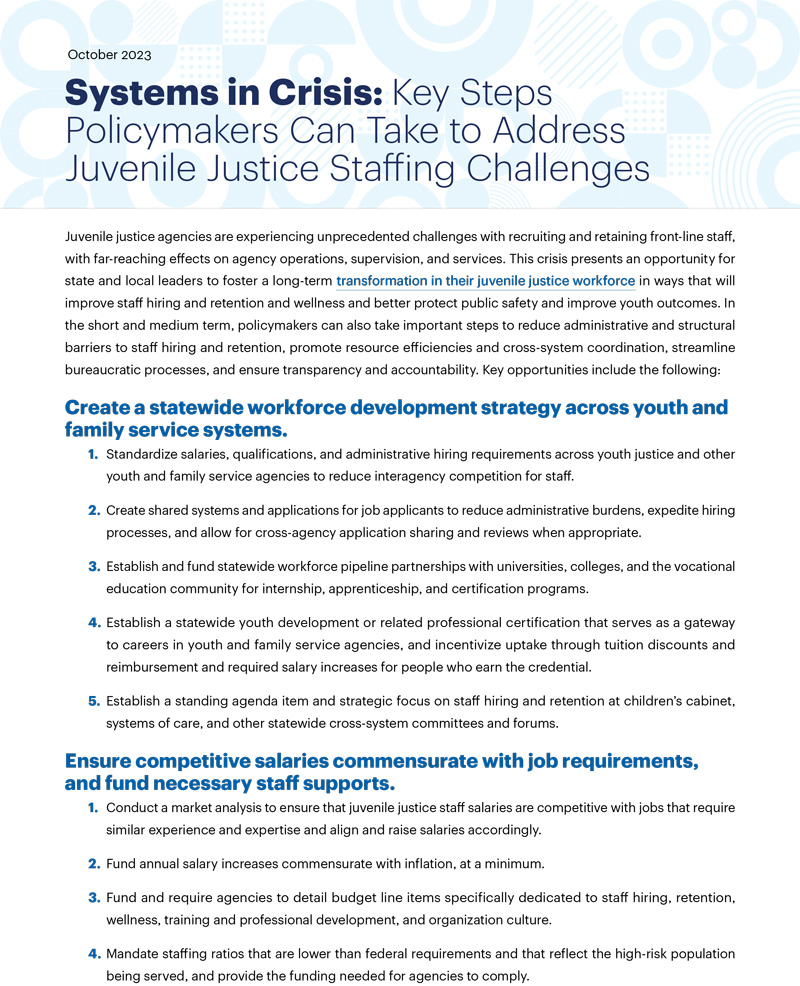
Key Steps for Policymakers
Juvenile justice agencies are experiencing unprecedented challenges with recruiting and retaining front-line staff, with far-reaching effects on agency operations, supervision, and services. This crisis presents an opportunity for state and local leaders to foster a long-term transformation in their juvenile justice workforce in ways that will improve staff hiring and retention and wellness and better protect public safety and improve youth outcomes. In the short and medium term, policymakers can also take important steps to reduce administrative and structural barriers to staff hiring and retention, promote resource efficiencies and cross-system coordination, streamline bureaucratic processes, and ensure transparency and accountability. Key opportunities include the following:
Create a statewide workforce development strategy across youth and family service systems.
- Standardize salaries, qualifications, and administrative hiring requirements across youth justice and other youth and family service agencies to reduce interagency competition for staff.
- Create shared systems and applications for job applicants to reduce administrative burdens, expedite hiring
processes, and allow for cross-agency application sharing and reviews when appropriate. - Establish and fund statewide workforce pipeline partnerships with universities, colleges, and the vocational education community for internship, apprenticeship, and certification programs.
- Establish a statewide youth development or related professional certification that serves as a gateway to careers in youth and family service agencies, and incentivize uptake through tuition discounts and reimbursement and required salary increases for people who earn the credential.
- Establish a standing agenda item and strategic focus on staff hiring and retention at children’s cabinet, systems of care, and other statewide cross-system committees and forums.
Ensure competitive salaries commensurate with job requirements, and fund necessary staff supports.
- Conduct a market analysis to ensure that juvenile justice staff salaries are competitive with jobs that require similar experience and expertise and align and raise salaries accordingly.
- Fund annual salary increases commensurate with inflation, at a minimum.
- Fund and require agencies to detail budget line items specifically dedicated to staff hiring, retention,
wellness, training and professional development, and organization culture. - Mandate staffing ratios that are lower than federal requirements and that reflect the high-risk population being served, and provide the funding needed for agencies to comply.
Reduce structural and administrative barriers to hiring and staffing innovations.
- Allow flexibility in hiring requirements related to education credentials, experience, and expertise for state and local agencies.
- Establish time limits for state agency job application, interview, and hiring processes.
- Eliminate statutory barriers that restrict people who have a juvenile or criminal record from working in public safety or youth-oriented fields, based on the severity of offenses, time since offense, and other criteria.
- Standardize and scrub hiring job applications and websites to reduce or eliminate language and
requirements—such as disclosure of previous nonviolent arrests, adjudications, or convictions—that
discourage potential applicants. - Eliminate administrative barriers and bureaucracy that prevent or complicate volunteers, credible
messengers, and service providers working with young people in facilities to supplement staff.
Promote goal setting, data collection, reporting, and accountability related to staffing.
- Require youth justice agencies to establish hiring and retention performance measures.
- Require youth justice agencies to collect and report on hiring and retention progress at least annually, and establish remediation strategies if agencies fail to meet these metrics.
- Require exit interviews with all departing staff and agencies to report on key themes and associated
improvement plans. - Establish a position within state ombudsman offices that focuses on staff wellness and abuses and offers a confidential outlet for public agency staff to share concerns.

This brief was prepared by The Council of State Governments Justice Center with support from the U.S. Department of Justice’s Office of Justice Programs’ Office of Juvenile Justice and Delinquency Prevention through grant number 15PJDP-21-GK-03216- JRIX. The opinions, findings, and conclusions or recommendations expressed in this publication are those of the authors and do not necessarily reflect those of the U.S. Department of Justice.

